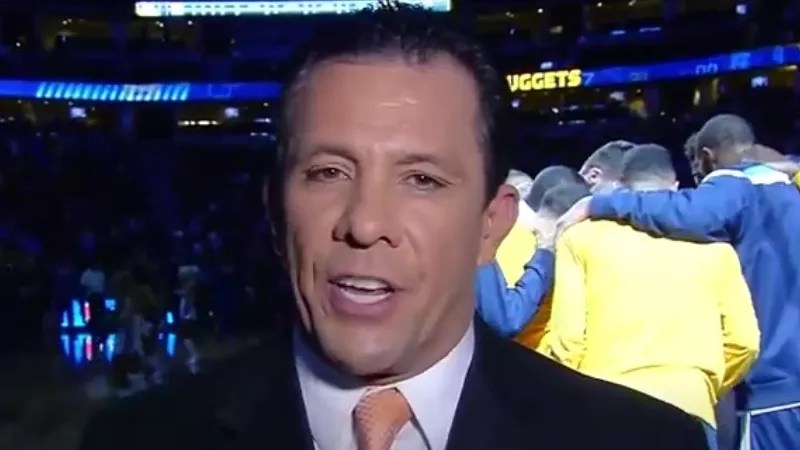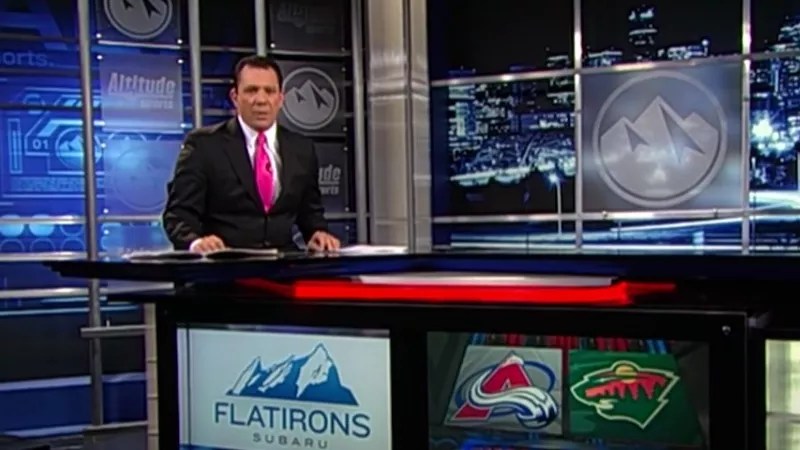

Audio By Carbonatix
Since August 2019, Altitude TV, the broadcast home of the Denver Nuggets and Colorado Avalanche, has been embroiled in a high-stakes pissing match with Comcast and DISH that has prevented customers of these services from seeing any of the games. But even as Altitude TV continues to press its lawsuit against Comcast, despite a judge throwing out several claims last November, the channel, owned by gazillionaire Stan Kroenke, is the target of a complaint from one of its host-reporters.
The plaintiff is Todd Romero, 56, who claims that he was essentially sidelined by Altitude TV, where he’s worked since 2012, after seeking treatment for prescription-drug dependency – and that’s not all.
An excerpt from the document, filed against Altitude Sports & Entertainment LLC and Kroenke Sports & Entertainment LLC in U.S. District Court on March 26, reads: “For years, Altitude/Kroenke paid Romero less than his non-Hispanic, non-brown-skin colored peers despite his consistently stellar performance. After Romero used his vacation time to successfully receive in-patient treatment primarily for prescription medication addiction related to a severe neck injury, Altitude/Kroenke regarded Romero as disabled and intentionally and unlawfully discriminated against him by not renewing his contract, falsely claiming that all on-air talent was being moved to at-will employment (when they were not) and systematically taking away all of Romero’s on-air host duties in favor of other hosts who are non-regarded as disabled, non-Hispanic, non-brown-skin colored and younger than forty-years old.”
Altitude TV officials have not responded to multiple inquiries about the lawsuit from Westword. But attorney Stacey Campbell of Denver-based Campbell Litigation, P.C., who represents Romero, sees a basic disconnect between Altitude TV’s public posture regarding its battle with Comcast and the way Romero has been treated.
“I’ve followed the Altitude and Comcast litigation a bit,” Campbell notes, “and it seems that Altitude wants public support for what it believes Comcast is doing – trying to create a David-and-Goliath situation. But then I look at what Altitude and Kroenke Sports has done to Todd Romero’s career, where they have taken the power they have and literally silenced Mr. Romero. It’s inconsistent with how Altitude wants the public to view it in relation to Comcast.”
While working for Altitude TV, the lawsuit notes, “Romero has hosted pre- and postgame shows for the Nuggets and Avalanche, provided play-by-play analysis for high school football and for the University of Denver men’s and women’s basketball teams. Romero has maintained excellent performance, recently reflected by an Emmy award with the 2018 Nuggets broadcast team, and two Emmy nominations he received during 2019.”

Opportunities for Todd Romero to anchor Altitude TV broadcasts have evaporated, his lawsuit claims.
The suit contends that during his time at Altitude TV, “most, if not all, on-air talent, including Romero, received employment contracts.” In January 2016, Romero signed a two-year pact with an option for a one-year extension through January 2019; he earned $95,481 in year one and $98,345 in year two, with $101,295.55 earmarked for the potential year three. But in June and July of 2016, Romero used his accrued vacation time to enter a rehabilitation facility that he hoped would help him stop taking the sleeping medication he was prescribed after hurting his neck. While he was able to successfully kick his habit, the suit contends that he was treated like damaged goods upon his return to work.
In September 2017, the suit claims, one executive told Romero that he was being “significantly underpaid” and deserved a new contract with a salary bump to $140,000. But the next month, the executive reportedly told Romero that his higher-ups had rejected the suggestion “in part because Romero went to rehab to address his addiction.”
After that, the suit contends, the exec changed his story, saying that negotiations for a new pact could begin after Romero completed the third year for his previous contract – and when his pay inched up to just over $100,000 as scheduled, he thought Altitude TV had picked up his option. He later learned that wasn’t the case; the exec said he and everyone else would be moved to “at-will employment instead of contracts.” But the complaint asserts that at least seven of Romero’s co-workers had received contracts – all of them “non-Hispanic, non-brown-skin colored, and/or non-disabled/regarded as disabled.”
In subsequent years, Romero’s face time ebbed. “For the first time in his career with Altitude/Kroenke, and despite his employment as a host, Romero has not been given any hosting duties during the course of the 2020-2021 NBA season,” the suit states. “Romero has not been informed when, if ever, he would be hosting again. Instead, Romero has been relegated to appearing in feature stories, which are typically four- to five-minute pre-recorded video pieces aired during the pre-game show of the Nuggets game’s broadcast. In addition to removing him from hosting duties, Romero is the only Altitude/Kroenke full-time on-air talent who is not permitted to come into the studio” under COVID-19 safety protocols.
Romero filed a discrimination charge with the federal Equal Employment Opportunity Commission and received a right-to-sue letter from the agency in January. One reason Romero did file suit, attorney Campbell says, relates to his belief that he’s been punished for doing the right thing.
“You would think Altitude and Kroenke would encourage employees with health needs to seek treatment to allow them to continue to perform their job,” he maintains. “It’s unfortunate that when Mr. Romero engaged in that type of activity, he suffered a detriment to his employment. The law protects employees who engage in protected activity from being discriminated against or retaliated against.”
Unlike Comcast and DISH customers, sports fans with DIRECTV can currently watch Altitude TV broadcasts, owing to an agreement in late 2019. Campbell says such viewers “can see that Mr. Romero, at the hands of Altitude and Kroenke, is now nothing more than an afterthought.”
Click to read Todd Romero v. Altitude Sports & Entertainment, LLC, et al.